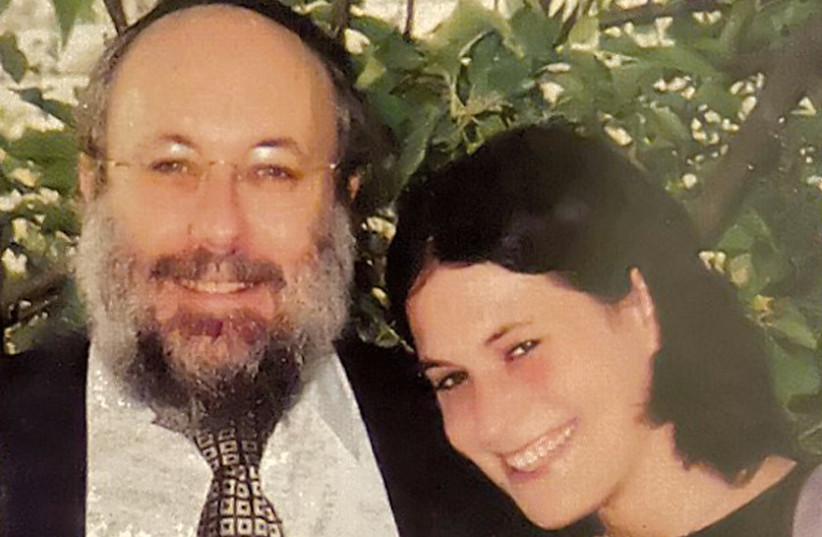“After the terror attack, there were many projects in the medical- and Torah-related fields and beyond that were dedicated to the memory of David and Naava z”l. This mikveh project is specifically in memory of Naava,” Debra Applebaum told In Jerusalem.
“After the terror attack, there were many projects in the medical- and Torah-related fields and beyond that were dedicated to the memory of David and Naava z”l. This mikveh project is specifically in memory of Naava.”
Debra Appelbaum
Naava attended this very mikveh (ritual bath) a few hours before the suicide bombing in which she and her father were murdered together with five other victims on September 9, 2003, at Café Hillel on Emek Refaim, where they had planned to pick up some drinks for those family members working at home on Naava’s wedding arrangements.
Commemorating a terror attack victim at a mikveh
Naava was the eldest daughter of David and Debra Applebaum, the third of six children. The Applebaums made aliyah in 1981 and settled in Jerusalem. Rabbi Dr. David, a pioneer in emergency medicine in Israel, was director of Magen David Adom’s Medical Intensive Care Units, founded Terem emergency medical clinics, and became chief of the emergency department and trauma services at Jerusalem’s Shaare Zedek Medical Center.
Naava graduated from Ulpanat Horev girls’ high school and belonged to the Ezra youth movement, where she volunteered as a madricha (leader) for two years. She served her first year of National Service at the Talpiot youth village in Hadera and her second year at Zichron Menachem, working with children suffering from cancer. She planned to study genetics at the Hebrew University of Jerusalem – her goal was to find a cure for cancer.
“The neighborhood mikveh by the Katamon Shtiblach on Hamatzor Street was in dire need of a major renovation, and given the fact that our kalah [bride], Naava, to be married the next day, immersed in it just hours before she was murdered, made this renovation a natural tribute to her memory. My husband, David, who was killed with Naava, is of course mentioned in the inscription on the gate,” continued Applebaum.

The mikveh, built circa 1948, belongs to the Religious Council and Rabbinate of Jerusalem. They were aware of the deteriorated condition of the mikveh – both cosmetically and in terms of its very foundations – but didn’t have the money for such a major renovation and were looking for partners. (The mikveh did undergo a cosmetic renovation 25 years ago, with donations from members of the neighborhood.)
The opening of the mikveh took place on Rosh Hodesh Adar this year (which happened to be the month of Naava’s birthday) in the presence of Jerusalem’s Chief Sephardic Rabbi Shlomo Amar, as well as other rabbis and officials, donors and all those professionals and workers who were involved in the project.
“Actually, 100 women had already used the mikveh before the opening ceremony, and they left it with tears of joy, as they remembered what it was like beforehand. The mikveh had been built with a tremendous sense of unity and togetherness,” said Efraim (Effy) Hochstein, who headed the project.
Applebaum paid tribute to Hochstein at the ceremony. “Thanks to Effy, this dream of ours has come to fruition. From beginning to the end, Effy was available all times of the day and night – no matter where he was in the world.”
Because of the complicated halachic issues that are connected with building a mikveh, Hochstein’s team hired a company run by Yechezkel Rosenberg called Mayim Tehorim, which specializes in the supervision of building mikvaot. Arik Nussbaum was the builder, and Dror Berber was the architect. They followed all halachic specifications to the letter and accommodated other traditions, such as those common among the Sephardim and Chabad.
The original structure of the mikveh consisted of two small mikvaot and six small preparation rooms. During the renovations, two large mikvaot and eight preparation rooms were built, including a kallah room and a room with wheelchair access. Each room has its own toilet.
Other features of the new mikveh include underfloor heating, an electric fragrance diffuser, piped-in classical music, a lavish waiting room and make-up room, and a state-of-the-art, environmentally friendly gas-based water heating system.
Rabbi Amar said at the opening ceremony: “I have seen many mikvaot in Jerusalem, but this has to be the most beautiful and well equipped. I hope and pray that members of the community will come and use it. The souls of the kedoshim [holy ones] David and Naava are part of this project and are present here.”
The whole community is welcome to use this modern new mikveh. ❖
To make an appointment: (02) 536-5174. During summer (until changing of clocks), it opens half an hour before sunset for three hours. On the eve of Shabbat, it opens half an hour after Shabbat comes in for half an hour; and on Saturday night, from an hour after Shabbat goes out.
